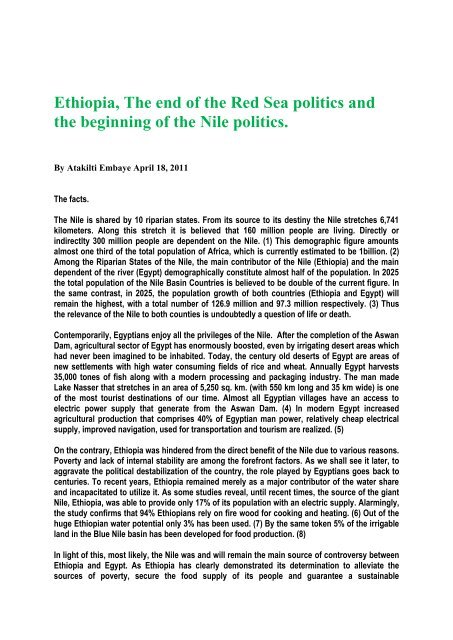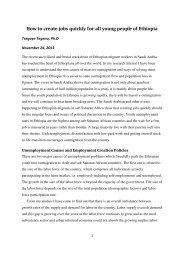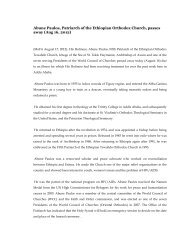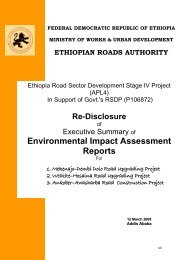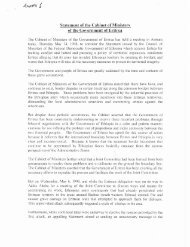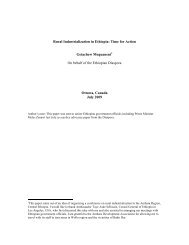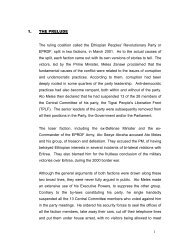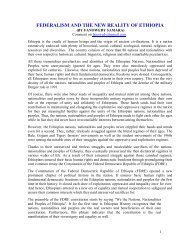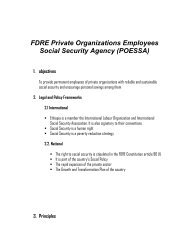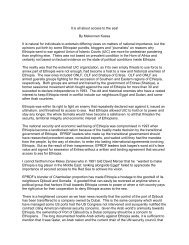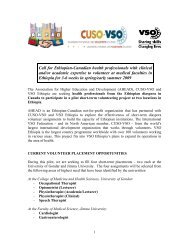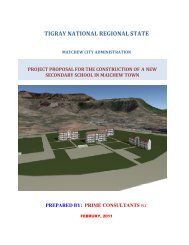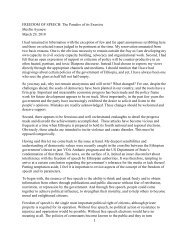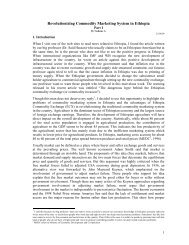Abay and the end of the red sea politics - Aiga Forum, an Ethiopian ...
Abay and the end of the red sea politics - Aiga Forum, an Ethiopian ...
Abay and the end of the red sea politics - Aiga Forum, an Ethiopian ...
Create successful ePaper yourself
Turn your PDF publications into a flip-book with our unique Google optimized e-Paper software.
Ethiopia, The <strong>end</strong> <strong>of</strong> <strong>the</strong> Red Sea <strong>politics</strong> <strong><strong>an</strong>d</strong><br />
<strong>the</strong> beginning <strong>of</strong> <strong>the</strong> Nile <strong>politics</strong>.<br />
By Atakilti Embaye April 18, 2011<br />
The facts.<br />
The Nile is sha<strong>red</strong> by 10 ripari<strong>an</strong> states. From its source to its destiny <strong>the</strong> Nile stretches 6,741<br />
kilometers. Along this stretch it is believed that 160 million people are living. Directly or<br />
indirectlty 300 million people are dep<strong>end</strong>ent on <strong>the</strong> Nile. (1) This demographic figure amounts<br />
almost one third <strong>of</strong> <strong>the</strong> total population <strong>of</strong> Africa, which is currently estimated to be 1billion. (2)<br />
Among <strong>the</strong> Ripari<strong>an</strong> States <strong>of</strong> <strong>the</strong> Nile, <strong>the</strong> main contributor <strong>of</strong> <strong>the</strong> Nile (Ethiopia) <strong><strong>an</strong>d</strong> <strong>the</strong> main<br />
dep<strong>end</strong>ent <strong>of</strong> <strong>the</strong> river (Egypt) demographically constitute almost half <strong>of</strong> <strong>the</strong> population. In 2025<br />
<strong>the</strong> total population <strong>of</strong> <strong>the</strong> Nile Basin Countries is believed to be double <strong>of</strong> <strong>the</strong> current figure. In<br />
<strong>the</strong> same contrast, in 2025, <strong>the</strong> population growth <strong>of</strong> both countries (Ethiopia <strong><strong>an</strong>d</strong> Egypt) will<br />
remain <strong>the</strong> highest, with a total number <strong>of</strong> 126.9 million <strong><strong>an</strong>d</strong> 97.3 million respectively. (3) Thus<br />
<strong>the</strong> relev<strong>an</strong>ce <strong>of</strong> <strong>the</strong> Nile to both counties is undoubtedly a question <strong>of</strong> life or death.<br />
Contemporarily, Egypti<strong>an</strong>s enjoy all <strong>the</strong> privileges <strong>of</strong> <strong>the</strong> Nile. After <strong>the</strong> completion <strong>of</strong> <strong>the</strong> Asw<strong>an</strong><br />
Dam, agricultural sector <strong>of</strong> Egypt has enormously boosted, even by irrigating desert areas which<br />
had never been imagined to be inhabited. Today, <strong>the</strong> century old deserts <strong>of</strong> Egypt are areas <strong>of</strong><br />
new settlements with high water consuming fields <strong>of</strong> rice <strong><strong>an</strong>d</strong> wheat. Annually Egypt harvests<br />
35,000 tones <strong>of</strong> fish along with a modern processing <strong><strong>an</strong>d</strong> packaging industry. The m<strong>an</strong> made<br />
Lake Nasser that stretches in <strong>an</strong> area <strong>of</strong> 5,250 sq. km. (with 550 km long <strong><strong>an</strong>d</strong> 35 km wide) is one<br />
<strong>of</strong> <strong>the</strong> most tourist destinations <strong>of</strong> our time. Almost all Egypti<strong>an</strong> villages have <strong>an</strong> access to<br />
electric power supply that generate from <strong>the</strong> Asw<strong>an</strong> Dam. (4) In modern Egypt increased<br />
agricultural production that comprises 40% <strong>of</strong> Egypti<strong>an</strong> m<strong>an</strong> power, relatively cheap electrical<br />
supply, improved navigation, used for tr<strong>an</strong>sportation <strong><strong>an</strong>d</strong> tourism are realized. (5)<br />
On <strong>the</strong> contrary, Ethiopia was hinde<strong>red</strong> from <strong>the</strong> direct benefit <strong>of</strong> <strong>the</strong> Nile due to various reasons.<br />
Poverty <strong><strong>an</strong>d</strong> lack <strong>of</strong> internal stability are among <strong>the</strong> forefront factors. As we shall see it later, to<br />
aggravate <strong>the</strong> political destabilization <strong>of</strong> <strong>the</strong> country, <strong>the</strong> role played by Egypti<strong>an</strong>s goes back to<br />
centuries. To recent years, Ethiopia remained merely as a major contributor <strong>of</strong> <strong>the</strong> water share<br />
<strong><strong>an</strong>d</strong> incapacitated to utilize it. As some studies reveal, until recent times, <strong>the</strong> source <strong>of</strong> <strong>the</strong> gi<strong>an</strong>t<br />
Nile, Ethiopia, was able to provide only 17% <strong>of</strong> its population with <strong>an</strong> electric supply. Alarmingly,<br />
<strong>the</strong> study confirms that 94% Ethiopi<strong>an</strong>s rely on fire wood for cooking <strong><strong>an</strong>d</strong> heating. (6) Out <strong>of</strong> <strong>the</strong><br />
huge Ethiopi<strong>an</strong> water potential only 3% has been used. (7) By <strong>the</strong> same token 5% <strong>of</strong> <strong>the</strong> irrigable<br />
l<strong><strong>an</strong>d</strong> in <strong>the</strong> Blue Nile basin has been developed for food production. (8)<br />
In light <strong>of</strong> this, most likely, <strong>the</strong> Nile was <strong><strong>an</strong>d</strong> will remain <strong>the</strong> main source <strong>of</strong> controversy between<br />
Ethiopia <strong><strong>an</strong>d</strong> Egypt. As Ethiopia has clearly demonstrated its determination to alleviate <strong>the</strong><br />
sources <strong>of</strong> poverty, secure <strong>the</strong> food supply <strong>of</strong> its people <strong><strong>an</strong>d</strong> guar<strong>an</strong>tee a sustainable
development, it is obvious that Ethiopia shall dep<strong>end</strong> on its natural recourses including <strong>the</strong> Nile.<br />
On <strong>the</strong> o<strong>the</strong>r h<strong><strong>an</strong>d</strong>, Egypt which considers <strong>the</strong> Nile as its natural gift will strive to turn every<br />
stone to maintain its possession <strong>of</strong> <strong>the</strong> Nile.<br />
As pointed out earlier, Egypt had never been at ease with Ethiopia. Though <strong>an</strong>cient documents<br />
are scares to single out as evidence what <strong>the</strong> engagement <strong>of</strong> <strong>the</strong> <strong>an</strong>cient Egypti<strong>an</strong>s was,<br />
however, recent history <strong>of</strong> both countries is imbued with various confrontations. In more<br />
modern times, especially in <strong>the</strong> 18 th <strong><strong>an</strong>d</strong> 19 th century, Egypt‟s invasion <strong><strong>an</strong>d</strong> final conquest <strong>of</strong> <strong>the</strong><br />
Sud<strong>an</strong> was largely motivated by its desire to secure control over <strong>the</strong> entire Nile system. (9) In<br />
o<strong>the</strong>r words, <strong>the</strong> objective <strong>of</strong> Egypti<strong>an</strong> conquest <strong>of</strong> <strong>the</strong> Sud<strong>an</strong> was designed to impose Egypt‟s<br />
will on Ethiopia <strong><strong>an</strong>d</strong> ei<strong>the</strong>r to occupy it or to force it to give up <strong>the</strong> Lake T<strong>an</strong>a area. (10)<br />
“Hence, <strong>the</strong> conquest <strong>of</strong> <strong>the</strong> Sud<strong>an</strong> in 1820 served as a stepping-stone to <strong>the</strong> increased<br />
appear<strong>an</strong>ce <strong>of</strong> Egypti<strong>an</strong> soldiers in <strong>the</strong> western frontiers <strong>of</strong> Ethiopia, <strong><strong>an</strong>d</strong> to <strong>the</strong> subsequent<br />
Egypti<strong>an</strong> occupation <strong>of</strong> Kasala in 1834, Metema in 1838, Massawa in 1846, Kunama in 1869, <strong><strong>an</strong>d</strong><br />
Harar in 1875. Khedive Ismail (1863-1879), too, w<strong>an</strong>ted to make <strong>the</strong> Nile <strong>an</strong> Egypti<strong>an</strong> river by<br />
<strong>an</strong>nexing to Egypt all <strong>the</strong> geographical areas <strong>of</strong> <strong>the</strong> basin. To that <strong>end</strong>, <strong>the</strong> Swiss adventurer<br />
Werner Munzinger (1832 -1875), who served him, had remarked: „Ethiopia with a disciplined<br />
administration <strong><strong>an</strong>d</strong> army, <strong><strong>an</strong>d</strong> a fri<strong>end</strong> <strong>of</strong> <strong>the</strong> Europe<strong>an</strong> powers, is a d<strong>an</strong>ger for Egypt. Egypt must<br />
ei<strong>the</strong>r take over Ethiopia <strong><strong>an</strong>d</strong> Islamize it, or retain it in <strong>an</strong>archy <strong><strong>an</strong>d</strong> misery.‟<br />
“Khedive Ismail decided to conquer Ethiopia. However, he lived to regret that decision. The<br />
series <strong>of</strong> military expeditions he launched in 1875 <strong><strong>an</strong>d</strong> 1876 resulted in ignominious defeats for<br />
Egypt. Between 14 <strong><strong>an</strong>d</strong> 16 November 1875, more th<strong>an</strong> 2,500 Egypti<strong>an</strong> soldiers were routed at <strong>the</strong><br />
Battle <strong>of</strong> Gundet. Similarly, from 7 to 9 March 1876, some 12,000 Egypti<strong>an</strong> soldiers were<br />
<strong>an</strong>nihilated at <strong>the</strong> Battle <strong>of</strong> Gurae. It may be interesting to note that <strong>the</strong> Egypti<strong>an</strong>s even recruited<br />
foreign military <strong>of</strong>ficers in <strong>the</strong>ir campaigns against Ethiopia. In <strong>the</strong> same year, <strong>the</strong> Afars<br />
decimated <strong>the</strong> expedition led by Munzinger in north eastern Ethiopia <strong><strong>an</strong>d</strong> Munzinger himself was<br />
killed. Yet, despite <strong>the</strong> enormous debacle, Egypti<strong>an</strong> raids against Ethiopia continued. They were<br />
eventually brought to a temporary halt only when Britain occupied Egypt in 1882.” (11)<br />
Besides this, Egypt had been always on a m<strong>an</strong>oeuvre to alienate Ethiopia from its neighbours.<br />
All Ethiopi<strong>an</strong> neighbours, whe<strong>the</strong>r <strong>the</strong>y belong to <strong>the</strong> Arab community or not, were recruited to<br />
join <strong>the</strong> Arab League which is dominated by Egypt. More interestingly, our Christi<strong>an</strong> Abyssini<strong>an</strong><br />
bro<strong>the</strong>rs, from next door Eritrea, were eager to join <strong>the</strong> League as me<strong>an</strong>s to gain more security,<br />
though <strong>the</strong>y later was brushed aside to remain with <strong>an</strong> observer status. As <strong>the</strong> Ethiopi<strong>an</strong><br />
government <strong>of</strong>ficially decla<strong>red</strong>, <strong>the</strong> main task <strong>of</strong> Egypti<strong>an</strong> lobbyists were aimed to secure that<br />
each possible window <strong>of</strong> foreign gr<strong>an</strong>t <strong><strong>an</strong>d</strong> lo<strong>an</strong> is const<strong>an</strong>tly closed against Ethiopia. Similarly<br />
<strong>the</strong> all rounded support to Eritre<strong>an</strong> armed fighters, during <strong>the</strong> armed struggle <strong><strong>an</strong>d</strong> <strong>the</strong> current<br />
indirect involvement <strong>of</strong> <strong>the</strong> Egypti<strong>an</strong> government in <strong>the</strong> Ethio - Eritrea conflict was <strong>the</strong><br />
continuation <strong>of</strong> <strong>the</strong> Egypti<strong>an</strong> policy that triggers on weakening <strong><strong>an</strong>d</strong> destabilizing Ethiopia <strong><strong>an</strong>d</strong><br />
distracting it from its developmental strides. In a word, though <strong>the</strong> Nile <strong>politics</strong> was not a hot<br />
issue that painfully affects <strong>the</strong> daily Ethiopi<strong>an</strong> livelihood as <strong>the</strong> Red Sea (Eritrea) <strong>politics</strong> had<br />
been two decades ago, <strong>the</strong> confrontation <strong>of</strong> both countries is deep rooted <strong><strong>an</strong>d</strong> multifaceted that<br />
goes to time immemorial.<br />
Nile <strong><strong>an</strong>d</strong> <strong>the</strong> Tr<strong>an</strong>s boundary waters law.
In modern <strong>politics</strong> that is gaining momentum <strong>of</strong> domin<strong>an</strong>ce in <strong>the</strong> international arena is hydro<strong>politics</strong>.<br />
Hydro- <strong>politics</strong> deals with <strong>the</strong> relationship <strong>of</strong> countries or states with regard to <strong>the</strong>ir<br />
sha<strong>red</strong> water resources <strong><strong>an</strong>d</strong> its m<strong>an</strong>agement. This comprises cooperation <strong>of</strong> development <strong>of</strong> <strong>the</strong><br />
sha<strong>red</strong> water, its usage as well as a conflict m<strong>an</strong>agement mech<strong>an</strong>ism when ever a dispute<br />
emerges. In most cases <strong>the</strong> engagement <strong>of</strong> hydro-<strong>politics</strong> is facilitated by expressed laws<br />
(treaties), or customary laws. While treaties are legal documents signed by Ripari<strong>an</strong> States,<br />
principles <strong>of</strong> customary laws em<strong>an</strong>ate from repeated practices <strong>of</strong> <strong>the</strong> actors (states). While<br />
treaties contain clear guidelines for implementation <strong>of</strong> <strong>the</strong> agreement, customary law lacks<br />
guidelines <strong><strong>an</strong>d</strong> is left open to <strong>the</strong> interpretation <strong>of</strong> <strong>the</strong> parties, which usually causes a conflict.<br />
In this respect, within <strong>the</strong> context <strong>of</strong> <strong>the</strong> Nile, Ethiopia <strong><strong>an</strong>d</strong> Egypt are nei<strong>the</strong>r party to a treaty nor<br />
abided by a customary law. So far, <strong>the</strong> treaties associated with <strong>the</strong> Nile are <strong>the</strong> treaty signed in<br />
1929, between Great Britain <strong><strong>an</strong>d</strong> Egypt <strong><strong>an</strong>d</strong> <strong>the</strong> 1959, treaty <strong>of</strong> <strong>the</strong> Sud<strong>an</strong> <strong><strong>an</strong>d</strong> Egypt. Of course,<br />
<strong>the</strong> recent Nile Basin Initiative (NBI) is <strong>the</strong> third one. In <strong>the</strong> former treaty, as far as <strong>the</strong> parties to<br />
<strong>the</strong> treaty nei<strong>the</strong>r comply with <strong>the</strong> legal constituency, in <strong>the</strong> context <strong>of</strong> Ripari<strong>an</strong> States nor <strong>the</strong><br />
guidelines <strong>of</strong> international law in relation with <strong>the</strong> principles <strong>of</strong> laws <strong>of</strong> Tr<strong>an</strong>s boundary waters, it<br />
is unquestionably null <strong><strong>an</strong>d</strong> void. The 1959, treaty <strong>of</strong> Egypt <strong><strong>an</strong>d</strong> <strong>the</strong> Sud<strong>an</strong> is by <strong>the</strong> same token<br />
null <strong><strong>an</strong>d</strong> void, since it excludes <strong>the</strong> main contributors <strong><strong>an</strong>d</strong> all Ripari<strong>an</strong> States <strong>of</strong> <strong>the</strong> Nile basin.<br />
„The NBI, at its initial stage was a partnership among <strong>the</strong> Nile Ripari<strong>an</strong> states that “seeks to<br />
develop <strong>the</strong> river in a cooperative m<strong>an</strong>ner, share subst<strong>an</strong>tial socioeconomic benefits, <strong><strong>an</strong>d</strong><br />
promote regional peace <strong><strong>an</strong>d</strong> security”‟. (12) It was „formally launched in February, 1999 by <strong>the</strong><br />
water ministers <strong>of</strong> 10 countries that share <strong>the</strong> river - Egypt, Sud<strong>an</strong>, Ethiopia, Eritrea, Ug<strong><strong>an</strong>d</strong>a,<br />
Kenya, T<strong>an</strong>z<strong>an</strong>ia, Burundi, Rw<strong><strong>an</strong>d</strong>a <strong><strong>an</strong>d</strong> <strong>the</strong> Democratic Republic <strong>of</strong> Congo.‟ (13) After 11 years <strong>of</strong><br />
negotiations <strong><strong>an</strong>d</strong> consultations with compatibility <strong>of</strong> international principles <strong><strong>an</strong>d</strong> guidelines it is<br />
<strong>end</strong>orsed by <strong>the</strong> majority <strong>of</strong> <strong>the</strong> Ripari<strong>an</strong> States <strong><strong>an</strong>d</strong> is <strong>the</strong> only viable treaty that acclaims<br />
international recognition. For obvious reasons, later on <strong>the</strong> process <strong>of</strong> crafting <strong>the</strong> Initiative,<br />
Egypt <strong><strong>an</strong>d</strong> <strong>the</strong> Sud<strong>an</strong> have opted to withdraw from <strong>the</strong> Nile Basin Initiative <strong><strong>an</strong>d</strong> are not parties to<br />
it. Therefore on <strong>the</strong> cooperative m<strong>an</strong>agement <strong>of</strong> <strong>the</strong> Nile River <strong><strong>an</strong>d</strong> its resources, Ethiopia <strong><strong>an</strong>d</strong><br />
Egypt lack a common bilateral or multilateral agreement that could be used as a reference.<br />
Thus in <strong>the</strong> absence <strong>of</strong> common bilateral or multilateral agreement, all Ripari<strong>an</strong> States should<br />
adhere to <strong>the</strong> general principles <strong>of</strong> <strong>the</strong> international agreement. In light <strong>of</strong> this, while Ethiopia<br />
opted to be a core member <strong>of</strong> <strong>the</strong> NBI, that crafted its principles in compatibility with <strong>the</strong> general<br />
principles international agreement <strong>of</strong> Ripari<strong>an</strong> States <strong>of</strong> a basin, Egypt is still defi<strong>an</strong>t to <strong>the</strong>se<br />
modern principle <strong>of</strong> <strong>the</strong> contemporary world <strong><strong>an</strong>d</strong> is <strong>end</strong>eavoring to maintain its absolute control<br />
<strong>of</strong> <strong>the</strong> Nile. However <strong>the</strong> arm twisting attitude <strong>of</strong> <strong>the</strong> Egypti<strong>an</strong>s is obsolete that contradicts <strong>the</strong><br />
modern engagement <strong><strong>an</strong>d</strong> cooperative mentality <strong>of</strong> <strong>the</strong> 21 st century <strong><strong>an</strong>d</strong> unrealistic since <strong>the</strong><br />
current Ethiopi<strong>an</strong> arm is not as fragile as one may think. Therefore, <strong>the</strong> only viable option <strong>of</strong><br />
Egypt is to refrain from its obsolete <strong><strong>an</strong>d</strong> fair tale convictions <strong><strong>an</strong>d</strong> accept <strong>the</strong> principles NBI <strong><strong>an</strong>d</strong><br />
join <strong>the</strong> initiative as a signatory. Above all, Ethiopia is not seeking to create <strong>an</strong>o<strong>the</strong>r<br />
Mediterr<strong>an</strong>e<strong>an</strong> <strong>sea</strong> in <strong>the</strong> heart <strong>of</strong> <strong>the</strong> l<strong><strong>an</strong>d</strong>, but a Dam that secures <strong>the</strong> over flooding <strong>of</strong> Egypti<strong>an</strong><br />
villages <strong><strong>an</strong>d</strong> consuming a partial water that evaporates in <strong>the</strong> m<strong>an</strong> made Lake Nasser. As <strong>the</strong><br />
Ethiopi<strong>an</strong> government has time <strong><strong>an</strong>d</strong> again decla<strong>red</strong> <strong>the</strong> construction <strong>of</strong> <strong>the</strong> Renaiss<strong>an</strong>ce Dam<br />
benefits peoples <strong>of</strong> both countries as well people <strong>of</strong> <strong>the</strong> region.<br />
The Realities.
While EPRDF emerged as a government after <strong>the</strong> fall <strong>of</strong> <strong>the</strong> Military Regime <strong>of</strong> Ethiopia, it is true<br />
that it has accepted <strong>the</strong> general principle <strong>of</strong> liberal democracy within <strong>the</strong> socio-political context<br />
<strong>of</strong> Ethiopia. In <strong>the</strong> preliminary years <strong>of</strong> its administration, EPRDF made clear that it adheres to<br />
<strong>the</strong> core principle <strong>of</strong> liberal democracy, but <strong>the</strong> involvement <strong>of</strong> <strong>the</strong> government in some sectors<br />
<strong>of</strong> <strong>the</strong> economy is vital <strong><strong>an</strong>d</strong> crucial. (14) Inter alia Energy Generating was <strong>the</strong> area where <strong>the</strong><br />
government selected as a key sector that <strong>the</strong> government opted to remain as <strong>an</strong> indispensible<br />
actor. (15) As decla<strong>red</strong> in <strong>the</strong> foundation laying ceremony <strong>of</strong> <strong>the</strong> Renaiss<strong>an</strong>ce Dam, <strong>the</strong> cost<br />
dem<strong><strong>an</strong>d</strong>ed to construct this Dam t<strong>an</strong>tamount to <strong>the</strong> current Annual Budget <strong>of</strong> Ethiopia. (16) If <strong>the</strong><br />
government was side lined from intervening in such strategy, <strong>the</strong> realization <strong>of</strong> <strong>the</strong> dam was only<br />
deemed to be a f<strong>an</strong>tasy. The sensitivity <strong>of</strong> <strong>the</strong> Nile hydro-<strong>politics</strong> in combination with <strong>the</strong> viability<br />
<strong>of</strong> <strong>the</strong> project <strong><strong>an</strong>d</strong> <strong>the</strong> huge cost needed for <strong>the</strong> construction could possibly hinder foreign or<br />
national investors in daring to take such a risk. Thus <strong>the</strong> construction <strong>of</strong> <strong>the</strong> Gi<strong>an</strong>t Renaiss<strong>an</strong>ce<br />
Dam became realistic with <strong>the</strong> bold <strong><strong>an</strong>d</strong> wise realization <strong>of</strong> <strong>the</strong> government to remain as <strong>an</strong><br />
indispensible actor in some vital economical sectors. In a word, in <strong>the</strong> Ethiopi<strong>an</strong> socio-political<br />
reality, it is vividly witnessing that <strong>the</strong> <strong>the</strong>ory that advocates for <strong>the</strong> existence <strong>of</strong> a<br />
developmental government is not optional.<br />
Fur<strong>the</strong>rmore, <strong>the</strong> bold <strong><strong>an</strong>d</strong> wise decision <strong><strong>an</strong>d</strong> declaration to construct <strong>the</strong> Renaiss<strong>an</strong>ce Dam has<br />
nothing to do with attention diversion, as some naïve compatriot members <strong>of</strong> <strong>the</strong> opposition<br />
block advocate. Prior to this, Ethiopi<strong>an</strong> government was seriously engaged in a const<strong>an</strong>t <strong><strong>an</strong>d</strong><br />
constructive negations <strong><strong>an</strong>d</strong> consultations with member states <strong>of</strong> <strong>the</strong> Nile Basin Initiative. While<br />
<strong>the</strong> Egypti<strong>an</strong>s stick to <strong>the</strong>ir centuries old declarations asserting that “Egypt reserves <strong>the</strong> right to<br />
take what ever course it sees suitable to safeguard its share, Egypt‟s share <strong>of</strong> <strong>the</strong> Nile‟s water is<br />
a historic right that Egypt has def<strong>end</strong>ed throughout its history,” (17) by being defi<strong>an</strong>t to<br />
accepted international norms <strong><strong>an</strong>d</strong> principles, <strong>the</strong> Ethiopi<strong>an</strong> government, in one h<strong><strong>an</strong>d</strong>, pursued to<br />
create legal institution along o<strong>the</strong>r sisterly Basin Countries, on <strong>the</strong> o<strong>the</strong>r h<strong><strong>an</strong>d</strong>, <strong>end</strong>eavo<strong>red</strong> to<br />
build its all rounded capacities.<br />
Some 25-30 years back, while <strong>the</strong> Egypti<strong>an</strong> leaders threaten proudly “<strong>the</strong> only matter that could<br />
take Egypt to war again is water,” (18) weighing <strong>the</strong>ir heavy military <strong><strong>an</strong>d</strong> diplomatic muscle <strong><strong>an</strong>d</strong><br />
in contempt <strong>of</strong> <strong>the</strong> o<strong>the</strong>r Ripari<strong>an</strong> States, in contrast, <strong>the</strong> diplomatic <strong><strong>an</strong>d</strong> economical status <strong>of</strong><br />
Ethiopia was not only weak but <strong>the</strong> existence <strong><strong>an</strong>d</strong> continuity <strong>of</strong> Ethiopia as a nation was<br />
questionable. The <strong>the</strong>n Ethiopia which was administe<strong>red</strong> by <strong>the</strong> leading present Diaspora<br />
opposition elements (Not all Diaspora opposition members) <strong>the</strong> status <strong>of</strong> Ethiopia derogated to a<br />
quasi state that could dismember easily. In o<strong>the</strong>r words, <strong>the</strong>n, <strong>the</strong> diplomatic <strong><strong>an</strong>d</strong> economical<br />
leverage <strong>of</strong> Egypt <strong><strong>an</strong>d</strong> Ethiopia could be contrasted as Goliath <strong><strong>an</strong>d</strong> David respectively.<br />
In recent years <strong>the</strong> status <strong>of</strong> Ethiopia is trem<strong>end</strong>ously ch<strong>an</strong>ging. Recent studies reveal that<br />
Ethiopia is r<strong>an</strong>ked as third Afric<strong>an</strong> country in deciding Afric<strong>an</strong> <strong>politics</strong>, after Nigeria <strong><strong>an</strong>d</strong> South<br />
Africa <strong><strong>an</strong>d</strong> followed by Egypt. Three, four decades ago as Egypt was a power house <strong>of</strong> <strong>the</strong><br />
middle east, because <strong>of</strong> its role in <strong>the</strong> Arab- Israeli conflict <strong><strong>an</strong>d</strong> its geographical position in <strong>the</strong><br />
Suez C<strong>an</strong>al, today Ethiopia is <strong>the</strong> powerhouse <strong>of</strong> <strong>the</strong> Horn <strong>of</strong> Africa because <strong>of</strong> stable <strong><strong>an</strong>d</strong> sound<br />
political <strong><strong>an</strong>d</strong> developmental achievements. Today Ethiopia is not only a pride to its citizens, but<br />
it is also a strong nation that makes m<strong>an</strong>y <strong>of</strong> its neighbors to rely on. Therefore <strong>the</strong> fruitful<br />
realization <strong>of</strong> Nile Basin Initiative, in <strong>the</strong> absence Egypt <strong><strong>an</strong>d</strong> <strong>the</strong> beginning <strong>of</strong> <strong>the</strong> construction <strong>of</strong><br />
<strong>the</strong> Renaiss<strong>an</strong>ce Dam, is <strong>the</strong> m<strong>an</strong>ifestation its strength. In this sense, when <strong>the</strong> Ethiopi<strong>an</strong><br />
government <strong>an</strong>nounces to construct this huge Dam, though <strong>the</strong> main capacity <strong><strong>an</strong>d</strong> support<br />
em<strong>an</strong>ates from its own <strong><strong>an</strong>d</strong> <strong>the</strong> Ethiopi<strong>an</strong> people at large, it is unwise to subordinate <strong>the</strong> backing<br />
<strong>of</strong> <strong>the</strong> o<strong>the</strong>r member states <strong>of</strong> <strong>the</strong> Initiative.
When <strong>the</strong> Ethiopi<strong>an</strong> government <strong>an</strong>nounces to construct this Historic Dam at this particular<br />
time, it is also total naivety or political ignor<strong>an</strong>ce to think that <strong>the</strong> government is attempting to<br />
divert attention from <strong>the</strong> “Arabs‟ Revolution”. Ra<strong>the</strong>r it is m<strong>an</strong>ipulating <strong>the</strong> regional <strong><strong>an</strong>d</strong> national<br />
opportunity at h<strong><strong>an</strong>d</strong>. Only naïves burn <strong>the</strong>ir homage while <strong>the</strong> house <strong>of</strong> <strong>the</strong>ir neighbor is ablaze.<br />
Since <strong>the</strong> construction <strong>of</strong> <strong>the</strong> Dam was publicized as part <strong>of</strong> <strong>the</strong> Growth <strong><strong>an</strong>d</strong> Tr<strong>an</strong>sformation Pl<strong>an</strong><br />
(GTP) to <strong>the</strong> Ethiopi<strong>an</strong> public months ahead <strong>of</strong> <strong>the</strong> so called “Arab Revolution”, as “Dam X”, it is<br />
nei<strong>the</strong>r logical nor rational to murmur or shout about attention diversion.<br />
Additionally, Ethiopi<strong>an</strong>s are emerging to a new <strong><strong>an</strong>d</strong> strong chapter <strong>of</strong> unity through <strong>the</strong><br />
Renaiss<strong>an</strong>ce Dam. When we examine <strong>the</strong> century old Ethiopi<strong>an</strong> modern history, except some<br />
historical events, like <strong>the</strong> battle <strong>of</strong> Adwa, most <strong>of</strong> <strong>the</strong> ag<strong>end</strong>as pursued by Ethiopi<strong>an</strong> political<br />
parties <strong><strong>an</strong>d</strong> governments were not all inclusive. Even if some ag<strong>end</strong>as <strong><strong>an</strong>d</strong> events enjoy mass<br />
support <strong>the</strong>y remain to be a sector oriented phenomenon. The “socialism Order” <strong>of</strong> <strong>the</strong> Degue<br />
<strong><strong>an</strong>d</strong> <strong>the</strong> subsequent proclamations were party oriented or party <strong>politics</strong>. The issue <strong>of</strong> claiming<br />
Eritrea was never <strong>an</strong> all inclusive ag<strong>end</strong>a to all Ethiopi<strong>an</strong>s.<br />
Similarly, <strong>the</strong> “Revolutionary Democracy”, <strong>of</strong> <strong>the</strong> EPRDF, <strong>the</strong> st<strong>an</strong>ce <strong>of</strong> EPRDF on l<strong><strong>an</strong>d</strong><br />
ownership, <strong>the</strong> current Federal system administration, etc, though <strong>the</strong> enjoy majority <strong><strong>an</strong>d</strong><br />
popular support, <strong>the</strong>y all are party oriented beliefs <strong><strong>an</strong>d</strong> convictions. On <strong>the</strong> o<strong>the</strong>r h<strong><strong>an</strong>d</strong>, <strong>the</strong> issue<br />
<strong>of</strong> developing <strong>the</strong> Nile River is a national asset. So that it is beyond party <strong>politics</strong> <strong><strong>an</strong>d</strong> it is a<br />
national ag<strong>end</strong>a, which should be welcomed by every citizen <strong>of</strong> <strong>the</strong> nation. Thus by this mere<br />
fact, EPRDF has introduced a new national ag<strong>end</strong>a that tr<strong>an</strong>sforms <strong>the</strong> unity <strong>of</strong> <strong>the</strong> Ethiopi<strong>an</strong><br />
people to a new peak. With <strong>the</strong> new GTP, Ethiopi<strong>an</strong> unity will be simult<strong>an</strong>eously tr<strong>an</strong>sformed.<br />
At last but not least, <strong>the</strong> construction <strong>of</strong> <strong>the</strong> Renaiss<strong>an</strong>ce Dam <strong><strong>an</strong>d</strong> <strong>the</strong> consequent<br />
developmental activities related with <strong>the</strong> Nile will introduce a new political l<strong><strong>an</strong>d</strong>scape. For <strong>the</strong><br />
last century or more, Ethiopia <strong><strong>an</strong>d</strong> Ethiopi<strong>an</strong>s‟ political engagement was mainly associated to<br />
<strong>the</strong> <strong>politics</strong> <strong>of</strong> <strong>the</strong> Red Sea. While <strong>the</strong> colonial powers, <strong><strong>an</strong>d</strong> <strong>of</strong> course Egypt too, tightened <strong>the</strong>ir<br />
grip to <strong>an</strong>nihilate <strong>the</strong> existence <strong>of</strong> strong Ethiopia by controlling <strong>the</strong> coastal area <strong>of</strong> <strong>the</strong> Red Sea<br />
<strong><strong>an</strong>d</strong> harboring <strong>an</strong>ti Ethiopia forces, Ethiopi<strong>an</strong>s remained defi<strong>an</strong>t <strong><strong>an</strong>d</strong> fought for <strong>the</strong> realization <strong>of</strong><br />
access to <strong><strong>an</strong>d</strong> from <strong>the</strong> <strong>sea</strong>. In a bitter <strong><strong>an</strong>d</strong> multifaceted strive, even if Ethiopia couldn‟t achieve<br />
<strong>the</strong> sovereign right to control <strong>the</strong> coastal area <strong>of</strong> <strong>the</strong> Red Sea its existence <strong><strong>an</strong>d</strong> continuity as a<br />
domin<strong>an</strong>t <strong><strong>an</strong>d</strong> respected nation state is not bargained. However, at <strong>the</strong> beginning <strong>of</strong> <strong>the</strong> 21 st<br />
century, Ethiopia emerged as a l<strong><strong>an</strong>d</strong> locked country engineering its <strong>politics</strong> to internal issues <strong>of</strong><br />
democratization <strong><strong>an</strong>d</strong> development.<br />
At this juncture, it is true that <strong>the</strong> <strong>politics</strong> <strong>of</strong> <strong>the</strong> Red Sea is not side lined. Along <strong>the</strong> ruling party,<br />
EPRDF, which believes efforts exerted to regain <strong>the</strong> coastal area, including Eritrea, are legally<br />
<strong><strong>an</strong>d</strong> politically impossible <strong><strong>an</strong>d</strong> erroneous, <strong>the</strong> opposition parties still believe <strong><strong>an</strong>d</strong> stride towards<br />
this goal.<br />
Never<strong>the</strong>less, <strong>the</strong> recent bold decision <strong>of</strong> <strong>the</strong> EPRDF led Ethiopi<strong>an</strong> government, to build <strong>the</strong><br />
Gi<strong>an</strong>t Renaiss<strong>an</strong>ce Dam, on <strong>the</strong> Nile River, will ch<strong>an</strong>ge not only <strong>the</strong> economical status <strong><strong>an</strong>d</strong><br />
benefit <strong>of</strong> Ethiopia but also ch<strong>an</strong>ges <strong>the</strong> road map <strong>of</strong> <strong>the</strong> Ethiopi<strong>an</strong> <strong>politics</strong>. Egypt which was<br />
engaged in proxy war against Ethiopia through various ways will ei<strong>the</strong>r cede to <strong>the</strong> legal norms<br />
or flounder to apply o<strong>the</strong>r mech<strong>an</strong>isms.<br />
Confrontations <strong><strong>an</strong>d</strong> m<strong>an</strong>euvers were already taking place. Even though <strong>the</strong> confrontations were<br />
not m<strong>an</strong>ifested in <strong>the</strong>ir highest form, with armaments, in a form <strong>of</strong> a war, as <strong>the</strong> government <strong>of</strong><br />
Ethiopia was busy to exploit <strong>the</strong> resource <strong>of</strong> <strong>the</strong> river with its limited capacity, on <strong>the</strong> o<strong>the</strong>r h<strong><strong>an</strong>d</strong>,
<strong>the</strong> Egypti<strong>an</strong>s were similarly active to tackle this. Now <strong>the</strong> utility <strong>of</strong> <strong>the</strong> Nile by <strong>the</strong> Ethiopi<strong>an</strong><br />
government is upgraded. The government is enjoying unparallel support <strong>of</strong> <strong>the</strong> Ethiopi<strong>an</strong><br />
people. Similarly <strong>the</strong> supreme task <strong><strong>an</strong>d</strong> concern <strong>of</strong> <strong>the</strong> government <strong>of</strong> Egypt will be<br />
unquestionably <strong>the</strong> Nile.<br />
For <strong>the</strong> generations to come, no more indirect deal or proxy contact with Egypt. The service<br />
r<strong>end</strong>e<strong>red</strong> by agents like Shaebia will be <strong>red</strong>uced or will be obsolete. Therefore, for uncertain<br />
eventualities we Ethiopi<strong>an</strong>s should join arms at least on this Gr<strong><strong>an</strong>d</strong> National Issue. Political<br />
parties <strong><strong>an</strong>d</strong> <strong>the</strong>ir leader should evaluate <strong>the</strong> current reality. For me, this is <strong>the</strong> right time at which<br />
Ethiopia is beginning to secure its historic position for generations to come. Advocating <strong><strong>an</strong>d</strong><br />
praying for <strong>an</strong> “Arab Revolution” at this particular period, in <strong>the</strong> l<strong><strong>an</strong>d</strong> <strong>of</strong> Abyssinia, is unrealistic<br />
for uncountable reasons <strong><strong>an</strong>d</strong> is wasting a golden opportunity. At least, let <strong>the</strong> current voice <strong><strong>an</strong>d</strong><br />
ambition <strong>of</strong> <strong>the</strong> Ethiopi<strong>an</strong> people prevail. In its history, really, Ethiopia is conducting a<br />
revolution, revolution from <strong>the</strong> Red Sea <strong>politics</strong> to <strong>the</strong> Nile <strong>politics</strong>. And it is part <strong><strong>an</strong>d</strong> parcel <strong>of</strong><br />
<strong>the</strong> Growth <strong><strong>an</strong>d</strong> Tr<strong>an</strong>sformation Pl<strong>an</strong>.<br />
References.<br />
1. Aljazeera inside story broadcasted 26 April 2010.<br />
2. Wikipedia <strong>the</strong> free encyclopedia, water <strong>politics</strong> in <strong>the</strong> region.<br />
3. Ibid.<br />
4. Ibid.<br />
5. Ibid.<br />
6. Tegenu, A, “United Nations Commission on sustainable development.” Review session,<br />
7. World energy council, 2006.<br />
8. Ararso <strong><strong>an</strong>d</strong> Tamrat 2005, Ethiopia <strong><strong>an</strong>d</strong> <strong>the</strong> eastern Nile basin.<br />
9. D<strong>an</strong>iel Kindie, Egypt <strong><strong>an</strong>d</strong> <strong>the</strong> Hydro-Politics <strong>of</strong> <strong>the</strong> Blue Nile River, 2001.<br />
10. Ibid.<br />
11. Ibid.<br />
12. Official document <strong>of</strong> <strong>the</strong> Nile Basin Initiative.<br />
13. Ibid.<br />
14. EPRDF, ye eihiadeg meleya emnetoch. Amharic version.<br />
15. Ibid.<br />
16. Speech made by Prime Minister Meles Zenawi.<br />
17. Mohammed Allam, Minister <strong>of</strong> water resources <strong>of</strong> Egypt.<br />
18. Anwar Sadat, Formed president <strong>of</strong> Egypt.


